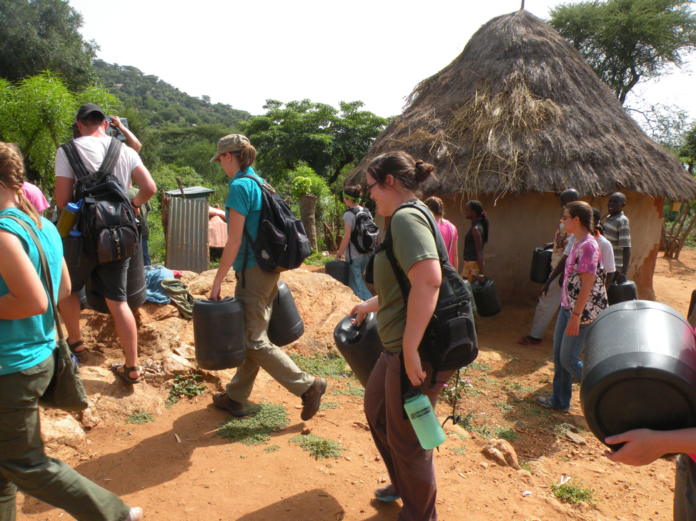I joined our Mercer On Mission team working in a remote community in the Pokot region of Kenya in the summer of 2014. We had come to the small village of Sisit to assist in the efforts of our partner, Africa Exchange, in bringing clean water to the people who lived scattered along the mountain range.
Under the leadership of Dr. Laura Lackey, who is now dean of Mercer’s School of Engineering, our students helped to construct bio-sand water filters that would turn the contaminated water of the nearby Wei Wei River into safe water for the children and adults of this community. Making the bio-sand water filters was painstaking work.
First, sand, pebbles and stones had to be gathered from the riverbed. Once collected, they had to be washed. This involved hours of standing knee-deep in the river, swishing them in pans in the flowing water to make sure that they were free of any debris.
Then the filters had to be assembled. This required drilling what seemed like a million holes in the small pipes that would line the inside of the filters, allowing the water to percolate through the various layers of sand, pebbles and stone.
After the filters were built, everything had to be carried up into the mountains and delivered to each family’s hut. So, like a column of busy ants, we carried 20-30 pound bags of sand, pebbles and stone up the steep path that led to our Kenyan friends’ homes.
We were amazed how the Kenyan mothers pitched in and helped us haul everything uphill. They didn’t have our expensive hiking shoes; they were barefoot. What they did have, however, were babies, wrapped tightly to their chests. They carried the same bags that we did on their backs with their babies in front, and still they passed us going up the path, like we were snails.
When we arrived at a family hut, we would gather all of our materials and start to layer them into the plastic jugs. It was hot and humid inside the huts, and there was no air moving as we poured in the bags of sand, pebbles and stone. After the water filters were complete, we placed them in the huts and then tested them to make sure they were working properly.
When the project was finished, inevitably, each family would invite us to stay for a cup of hot chai. These families were extremely poor, living off of the few vegetables they could grow in their gardens on the mountain slopes. But they were happy and generous and offered us what they had — hot chai.
Even though we were pouring sweat, how could we refuse our gracious hosts? We drank the hot tea (which was actually delicious and somehow made me feel cooler) and talked and laughed. We learned about their lives, their families, their community. The conversation was also warm and delightful with these happy people.
In the evenings, we would sit with our students and reflect on the experiences of the day. I can still hear the words of one of our students who expressed surprise at how happy the people were. She said, “They have nothing, nothing at all, of the things that we have. And even if they did, they have no electricity to power them. And yet they are happier than we are. Why is that? I don’t get it.” Other Mercer On Mission students echoed their amazement at this remarkable irony.
Our students and faculty eventually returned home; our project was complete. But the impact of that experience was not complete. The truth of what we saw in those poor but happy Kenyans continues to impact us now almost a decade later. They had found happiness in something other than the latest iPhone or new shoes, something that couldn’t be bought because it was free.
They were delightfully satisfied with the simplest gifts. They were surrounded by a large and loving family and community. They had enough food to eat (usually rice and beans), enough clothes to wear (usually the same ones each day), and a roof (made of thatch) over their heads. What more could they want?
They lived a sturdy but gentle life, bowing to the rhythms of nature and the grandeur of the Kenyan hills. They found happiness in the laughter of the children, the wonder of the elders’ stories, the sweet gift of love and the abundance of enough.
Approaching this time of thanksgiving, perhaps you are finding it difficult to feel thankful. I get that. Sometimes life can be very challenging and disappointing. A hope fades; a relationship breaks; a gift is lost. It is no good to play Pollyanna in the face of such realities. They hurt.
And yet maybe there is something we can learn from our Kenyan friends. Maybe there is still room for thankfulness. They teach us that the best gifts of life are simple and free and are more abundant than we might imagine — the gifts of love and beauty, of friendship and community, of rest and play and good work to do, of songs and stories, of a crackling fire under a starry sky. Ah, our lives are overflowing with priceless treasures.
I am wishing you a truly happy and grateful Thanksgiving.










